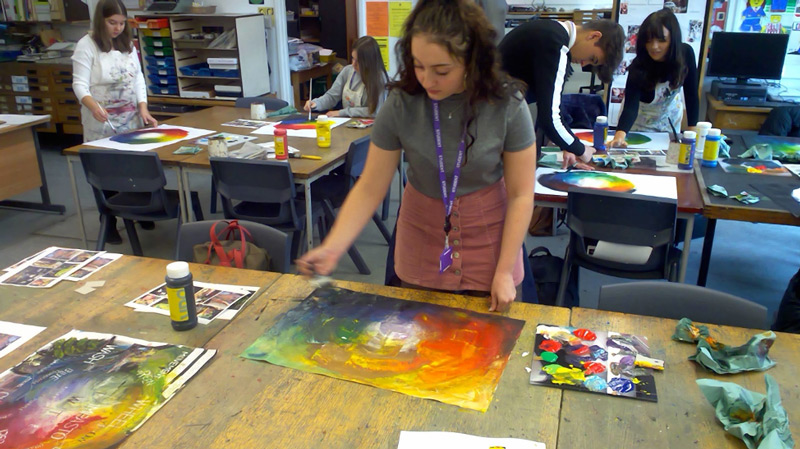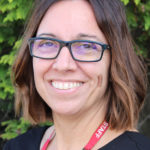What it is like to be an A level Art and Photography student at Alsager School
The Art department aims to provide an inspiring environment where students can express themselves and develop their creative skills. We offer A-levels in both Fine Art and Photography. In order to give you an insight into what you can expect to study on these 2 courses, we have included a short summary highlighting key features as well as the views of some of our current A-level students discussing their experiences.
Fine Art A-Level
The Fine Art course is a two year A-Level subject where you will develop and learn how to make informed decisions about your own creative artwork and the world around you in a culture of experimentation, exploration and critical reflection. We will support you to become skilled in your ability to use a broad range of art materials and techniques influenced and inspired by the work of contemporary and traditional artists, designers and photographers. You will be challenged to investigate and reflect upon your own practice to take imaginative and creative risks in the artwork you produce.
Building upon the techniques you will learn, you can explore any combination of painting and drawing, mixed media, intaglio printing, photography and digital manipulation using Adobe Photoshop.
Each individual student will develop their own visual style influenced by the workshops we will deliver. The skills you will develop will be wide and varied with a particular focus on personal expression and developing your own unique style and approach. Fine Art is about looking, learning, thinking and communicating about the styles and work of your chosen artists.
At A-level for component 1 you will develop work for a personal investigation into an idea, issue, concept or theme supported by written material. This will count for 60% of your total A-level marks. In component 2 you will produce personal work in response to one of eight exciting starting points which will count for 40% of your total A-level marks.
Photography A-Level
The Photography course is a two year A-Level subject where you will learn how to use a broad range of photographic techniques influenced and inspired by the work of contemporary and traditional photographers, designers and artists. You will be challenged to investigate and reflect upon your own practice and to take imaginative and creative risks in the images you produce. You will be taught the Techniques of Production of photography including Adobe Photoshop and explore Documentary, Still Life and Abstract photography before developing a personal project. We provide you with your own Sixth Form Studio in D10 with access to computers in which you can develop your portfolio outside of lessons. The course is designed using Microsoft OneNote and your final portfolio will be a digital Flip eBook that can be accessed online.
Each individual student will develop their own visual style influenced by the taught photographic workshops. The skills you will develop will be wide and varied with a particular focus on personal expression and developing your own style and approach. The most exciting aspect of photography is that you are capturing the world as you see it through your own eyes.
Here in the Art Department we help students to learn in a supportive environment. I love teaching both Fine Art and Photography because it is truly inspiring to see how students embrace the skills they learn and then apply these in their work. The subjects we teach give students a platform where they can show-case their creative flair and express themselves in a way that is unique to Fine Art and Photography.
Mrs Donathy
Assistant Curriculum Leader for ADT
How is the A level different to GCSE Art?
“A-level art is an opportunity to develop the artistic skills you developed at GCSE but in a much more expressive and personal way. Each student has the opportunity to establish a personal style which was introduced towards the end of year 11” (Fine Art student)
“A level Art is relatively similar to GCSE, in the sense of the format of the coursework and the exam structure, meaning that the transition between year 11 and year 12 feels less of an overwhelming jump. Nevertheless, at A Level, students are given a lot more freedom as to what they want to do with their coursework. The Art Department at A Level provides a relaxed environment in which we can quietly get on with our work- I am always in there when i have non-contacts!” (Fine Art student)
What advice would you give to a GCSE student who is considering taking it at A Level?
“Ensure that you have a real passion for the subject as it requires dedication, effort, and a creative flare. Coming up with new ideas and concepts for your art can be tricky when its expected of you regularly, but a true artist flourishes under these conditions and utilizes the creative push, using this as an opportunity to demonstrate their skills and enjoy the creative process” (Fine Art student)
“My advice for going into A level Art is don’t expect to create a masterpiece straight away. It takes time, dedication, hard work and resilience” (Fine Art student)
“I highly recommend that you take it as it is a very friendly environment to work in. For me it truly brought out the artist in me and I am sure it will bring out the artist in you. I am still amazed that the teachers are equally as enthusiastic as the student to your work and are always ready to lend a hand and guide you forward. Since joining sixth form the department became my second home and I never complain about always being here as it’s so calm and friendly” (Photography student)
What has been the most enjoyable aspect of the course for you?
“I have really enjoyed being able to use different materials and media in my art as I find it therapeutic” (Fine Art student)

“Personal projects are definitely my most enjoyable aspect as you get to work with what you love and present a portfolio you are happy and confident with” (Fine Art student)
“The most enjoyable part of the course for me is when I’m setting up the shoot that I want and then looking at the photos that it produced. This is because it helps me to identify what I need to do to make my shoots better. We have explored how to change the exposure, aperture and shutter speed and this was useful in the way that I can change them to suit the different shoots that I’m doing” (Photography student)
What techniques and approaches have you explored?
“Since starting A Level Art, my ability to experiment, and be expressive has definitely developed. We’re constantly encouraged to push ourselves and try out new techniques, which really pays off later on in the course. When studying Clare Woods, we delved into abstract painting, and emotive colour use. Prior to that project, we explored a multitude of drawing techniques and illustrated natural forms. For me, Art is a development process and I’m constantly learning from my successes and failures” (Fine Art student)
“Within the course I have learnt how to use a camera manually and explored different camera techniques and tricks to make my images look better. For example, I have learnt how to paint with light. Painting with light is where you lengthen the shutter speed of your camera so that it takes the picture slower” (Photography student)
“I experiment with colour, different types of media and materials to create my pieces. I really enjoy creating art from natural forms and landscapes” (Fine Art student)
“In the beginning of the course we focused on natural forms and how photography can be used to alter how vibrant an image looks. Taking inspiration form Clare Woods, we produced concertinas, photography sheets and our own studies” (Fine Art student)
How have you been challenged?
“It can be challenging to generate new ideas and creative thoughts on a regular basis, but for anyone brimming with new ideas and inspiration, this should come easily. In fact, this provides an outlet for your creativity to flow” (Fine Art student)
“From the beginning of year 12 the pieces you create begin to build your portfolio therefore it is important to manage your time wisely. I have found that utilising my non-contacts to come to the art department is highly beneficial” (Fine Art student)
“I have been challenged to the task of learning how to use Photoshop and what you can do on it, also I have been challenged on how to use the camera manually rather than automatic meaning you control every aspect of the lens” (Photography student)

“Making sure the camera settings are right. Sometimes, it’s difficult to get the exposure correct or the focus correct because they aren’t on the right settings and this makes the photo’s come out wrong, either too dark or light or not being able to tell what the photos are” (Photography student)






